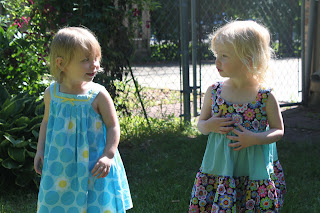The thing about having a child with a significant speech delay is that you can never stop watching.
Pacey will be five in November. His most significant area of developmental delay is his speech and he is, for the most part, not proficient in verbal communication. That's not to say he doesn't communicate...he uses sign language and gesturing and, sometimes, what looks a lot like a game of charades. He's pretty adept at communicating the most basic needs: he can sign or ask for simple things like a specific food or drink, to go potty, that something is hot or cold and similar. He can count and say the alphabet and can sight read familiar words (mostly names and titles).
However, he doesn't really have a way of indicating his preferences (without being given a visual choice), is pretty much limited to answering yes or no questions and doesn't have the means to explain things to us yet. Pacey's speech delay, as I understand it, is related to a motor processing disorder. His brain knows what it needs to say, but in the journey from brain to mouth things get a little...garbled. His pronunciation of most words is pretty unclear and, to complicate things, the pronunciation he uses tends to be inconsistent. When we are practicing a word, he may pronounce it differently 4 times out of 5.
It's really hard, therefore, even for me to discern what exactly he is trying to say a lot of the time. And so I watch. I'm sure it comes across as hovering to onlookers, and I suppose that's what it is. But the truth is, if Pacey comes to me in tears from the playground I have no idea whether it is a physical injury, hurt feelings or something else that has upset him and he can't explain it.
I know Pacey has preferences and favorites - of course he does. But, if you were to ask him his favorite color he couldn't tell you. I know, because I watch, that nine times out of ten he will select a red object if it's a choice and so I am reasonably certain his favorite color is red. If I hadn't been watching, however, I would have no idea.
Pacey also has trouble expressing things like hunger, tiredness, a specific pain or a frustration with something. So again, I watch. When he is upset about something and I am trying to "diagnose" the problem, I run through all the basic needs: has he had enough to eat/drink, when did he last go potty, what's the temperature like, etc. This is a lot easier to do now that I am with him all day. When he was at daycare all day I'd have an especially hard time figuring out what he needed or wanted.
In a lot of ways I am naturally really well suited to being Pacey's mom because I'm an introvert and I also communicate in lots of ways besides talking. I'm pretty intuitive and obviously very in tune with Pacey's "rhythms." There are times, though, that no matter how hard I try and listen and attempt to diagnose, I CANNOT figure out what he needs or wants. And I can't help but feel like I've failed him in those moments. Beyond his basic needs, I long to know what Pacey's thinking and how he sees the world.
I know that this is somewhat common with kids in general; I read somewhere that developmentally, children are not very adept at localizing a source of pain until they are six years old (this is why sometimes they will say their tummy hurts when actually it's a sore throat). And, frankly, kids are sort of unreliable with information anyway. But this speech delay for Pacey isn't one that will magically improve overnight and sometimes it feels like a long slog ahead of us.
Although this has become something of a ramble, I will put in a quick plug for Signing Time, the sign language program developed specifically for kids. Pacey and Brighton both love watching these DVDs and have acquired a pretty astonishing vocabulary of signs. It encourages them to simultaneously sign and say words and phrases, which is great when you have pronunciation issues. Pacey has even made up some of his own signs for things which has been a great tool for him. I'm surprised at how much Brighton signs as well - before we had Pacey I was sooo not interested in sign language for kids but now I'd recommend it wholeheartedly, special needs or not.




































